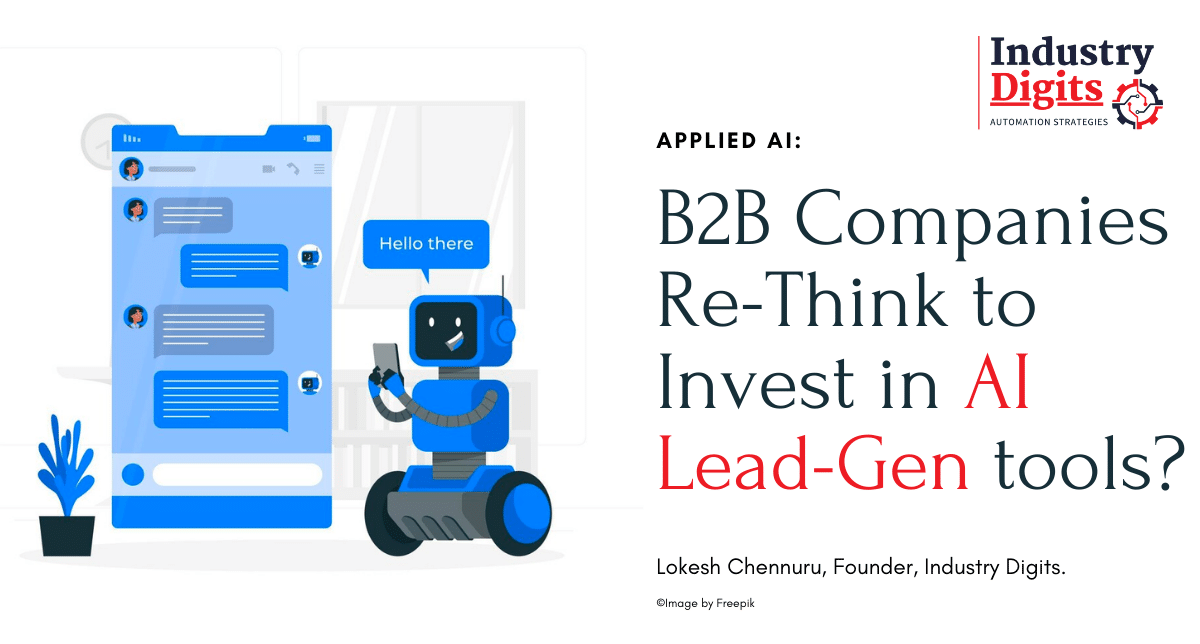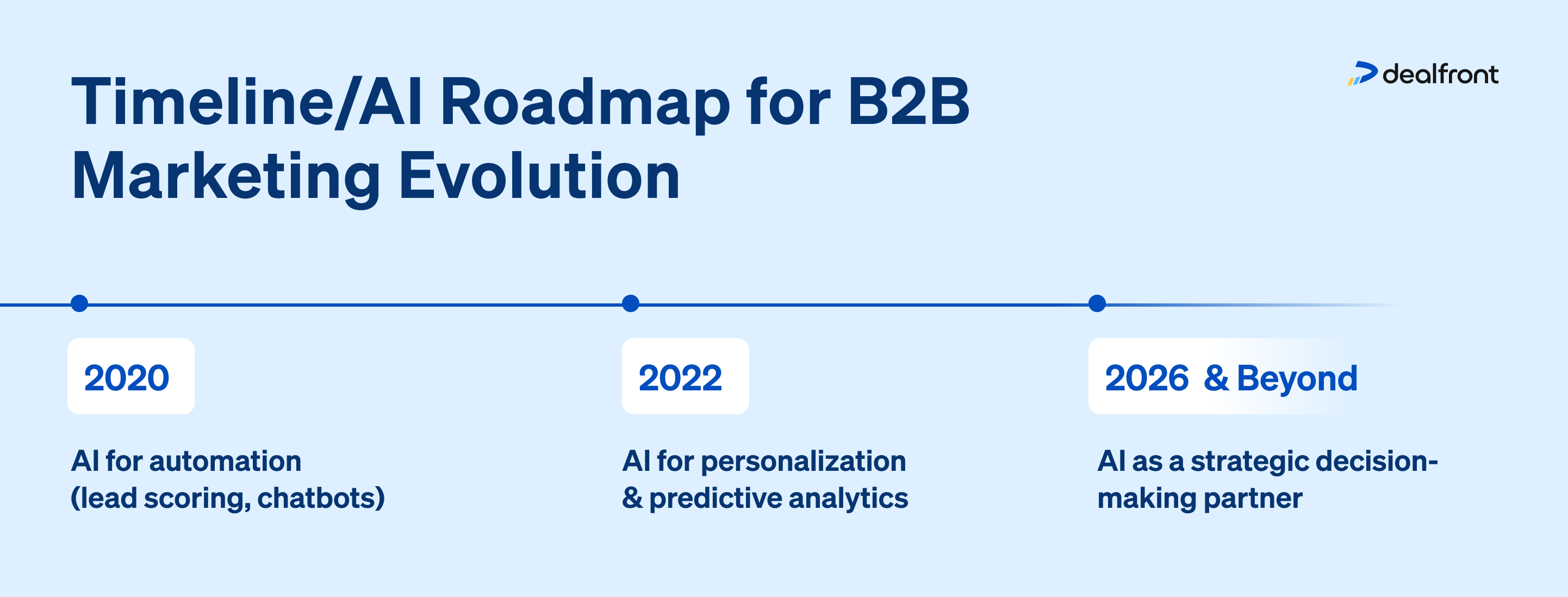How AI Automation For B2B reduces costs while improving efficiency
Wiki Article
Unlock Efficiency and Development With AI Automation for B2B Firms
AI automation is changing the landscape for B2B firms. It decreases and improves operations dependence on human treatment. This shift allows businesses to make quicker, data-driven decisions. As organizations explore which refines to automate, they need to likewise consider the right tools to apply. Nonetheless, difficulties remain in taking on AI modern technology. Minarik AI. The effects of these changes can form the future of several business in means yet to be totally comprehendedComprehending AI Automation in the B2B Context
As companies increasingly seek performance, recognizing AI automation in the B2B context ends up being vital. AI automation includes employing innovative modern technologies to simplify procedures, minimize human intervention, and boost decision-making procedures. In the B2B landscape, this can materialize in different kinds, such as automating customer support communications, taking care of supply chain logistics, or enhancing advertising projects. Business can leverage AI to assess enormous datasets rapidly, enabling them to recognize patterns and understandings that notify strategic selections. AI systems can incorporate seamlessly with existing modern technologies, providing a natural platform for handling organization functions. This understanding lays the foundation for organizations to check out just how AI can transform their procedures, boost productivity, and eventually foster lasting growth in a competitive market.Trick Benefits of Carrying Out AI Automation

Recognizing Procedures Ideal for Automation

Picking the Right AI Tools for Your Service
When B2B firms think about automating their procedures, picking the ideal AI tools ends up being important for attaining desired results. Business should begin by assessing their unique needs and objectives, making certain placement with business objectives (Minarik AI). Examining the scalability, flexibility, and integration capacities of potential devices is important, as these elements establish long-lasting effectiveness. Organizations should additionally think about user-friendliness and the degree of support offered by suppliers, as these components can impact effective implementation. On top of that, assessing customer reviews and situation researches can provide insights right into just how particular AI services do in real-world circumstances. By meticulously selecting AI tools that fit their functional needs, B2B firms can boost efficiency and drive growth while decreasing possible disturbancesOvercoming Challenges in AI Adoption
B2B business commonly run into substantial challenges in adopting AI technologies, particularly issues connected to data quality and resistance to alter management. Poor information high quality can impede the effectiveness of AI systems, while employee hesitation to welcome brand-new procedures can stall implementation efforts - AI Automation For B2B. Addressing these challenges is important for successful AI assimilation and optimizing its prospective benefitsInformation Quality Issues
Guaranteeing high information high quality is vital for the successful fostering of AI modern technologies in business-to-business atmospheres. Incorrect, incomplete, or obsolete information can badly impede AI initiatives, bring about wrong understandings and poor decision-making. Companies usually deal with challenges such as information silos, variances across different resources, and a lack of standard data layouts. To get over these problems, organizations have to purchase data cleaning, integration, and administration procedures. Carrying out durable data monitoring techniques ensures that the info fed right into AI systems is pertinent and trustworthy. Moreover, fostering a society of data top quality awareness among staff members can enhance information accuracy gradually. By dealing with data quality concerns, B2B business can release the full potential of AI automation, driving performance and development.Modification Monitoring Resistance

Measuring the Influence of AI Automation
Gauging the effect of AI automation in B2B business requires a clear understanding of vital efficiency indicators (KPIs) that straighten with organization objectives. Effective information analysis methods are vital for analyzing the results, while durable ROI analysis strategies aid identify the financial advantages of automation efforts. Together, these parts offer an extensive structure for reviewing AI's payments to organizational success.Trick Performance Indicators
Trick performance indications (KPIs) function as necessary tools for B2B companies to examine the effectiveness of AI automation campaigns. By establishing clear metrics, companies can measure improvements in functional effectiveness, price reduction, and earnings growth straight attributable to automation. Common KPIs include cycle time reduction, mistake prices, client complete satisfaction scores, and employee efficiency degrees. These indicators give insights into just how AI systems are maximizing processes and boosting overall performance. In addition, go to website tracking KPIs enables business to recognize locations for more enhancement and to line up AI automation initiatives with tactical service purposes. Ultimately, a well-defined framework of KPIs assurances that B2B business can quantitatively review the impact of AI automation on their operations and drive continuous growth.Information Analysis Methods
Reliable information analysis techniques play a necessary duty in evaluating the influence of AI automation within B2B firms. By utilizing statistical methods, organizations can determine patterns and patterns in operational information, allowing them to evaluate the effectiveness acquires accomplished with automation. Methods such as regression analysis and time collection projecting offer understandings right into just how AI-driven procedures affect productivity and decision-making. Additionally, data visualization tools can effectively communicate findings to stakeholders, facilitating informed strategic decisions. Artificial intelligence formulas can further boost evaluation by predicting future outcomes based upon historic data, providing actionable understandings. Inevitably, these strategies allow B2B business to measure success and optimize their AI automation campaigns, making sure alignment with business purposes and improving general performance.ROI Analysis Methods
Assessing the roi (ROI) of AI automation is crucial for B2B business seeking to recognize the monetary implications of their technical efforts. Firms can utilize various ROI analysis methods to gauge the performance of AI applications - AI Automation For B2B. One reliable approach entails calculating price savings by contrasting operational expenditures before and after automation (Minarik AI). Furthermore, measuring productivity renovations with essential efficiency signs (KPIs) assists quantify the advantages of AI. Consumer complete satisfaction metrics can additionally supply insights right into the effect of automation on service quality. To ensure an extensive assessment, firms ought to consider both direct intangible advantages and financial returns, such as boosted decision-making capabilities and affordable benefit. This multifaceted analysis allows B2B firms to make educated choices concerning future financial investments in AI innovationFuture Trends in AI Automation for B2B Firms
What developments exist ahead for AI automation in B2B business? Emerging patterns show a significant shift in the direction of boosted data analytics abilities, enabling companies to make even more informed decisions. Predictive analytics will certainly come to be increasingly vital, permitting companies to expect market modifications and consumer needs. Furthermore, the combination of AI with Net of Things (IoT) innovation is anticipated to simplify operations by giving real-time insights and automation of processes. Business will likewise concentrate on boosting customer experiences via personalized advertising driven by AI formulas. In addition, innovations in natural language processing will facilitate far better interaction in between businesses and clients. As these fads evolve, B2B companies must adapt to leverage AI automation effectively, guaranteeing sustained growth and competitive benefit.Regularly Asked Inquiries
What Industries Advantage one of the most From AI Automation in B2B?
Manufacturing, financing, healthcare, and logistics industries benefit one of the most from AI automation in B2B. These fields utilize AI to enhance processes, enhance decision-making, and boost general operational efficiency, driving significant development and technology.Exactly How Does AI Automation Effect Employee Responsibilities and Responsibilities?
AI automation improves worker roles and responsibilities by simplifying repeated tasks, making it possible for workers to focus on critical campaigns. This shift fosters ability development, boosts efficiency, and encourages cooperation, eventually driving organizational development and development.What Prevail Misconceptions Concerning AI Automation in B2B?
Common false impressions regarding AI automation in B2B consist of worries of work loss, beliefs that AI can completely change human judgment, and taking too lightly the significance of cooperation between AI systems and staff members for optimal outcomes.How Can Services Make Certain Data Privacy With AI Automation?
Organizations can guarantee data personal privacy with AI automation by applying robust file encryption procedures, sticking to governing conformity, conducting routine audits, and training workers on information handling practices to reduce dangers and secure sensitive details.What Are the Expenses Related To Executing AI Automation?
The prices related to implementing AI automation include software application purchase, framework upgrades, training employees, recurring upkeep, and potential downtime during integration. Additionally, companies may incur expenses associated with information security and conformity measures.Gauging the influence of AI automation in B2B firms needs a clear understanding of crucial efficiency signs (KPIs) that line up with service goals. Secret performance indicators (KPIs) offer as important tools for B2B firms to examine the performance of AI automation efforts. Efficient data evaluation strategies play an essential duty in reviewing the impact of AI automation within B2B companies. Reviewing the return on financial investment (ROI) of AI automation is necessary for B2B business seeking to understand the financial implications of their technical efforts. What developments lie in advance for AI automation in B2B business?
Report this wiki page